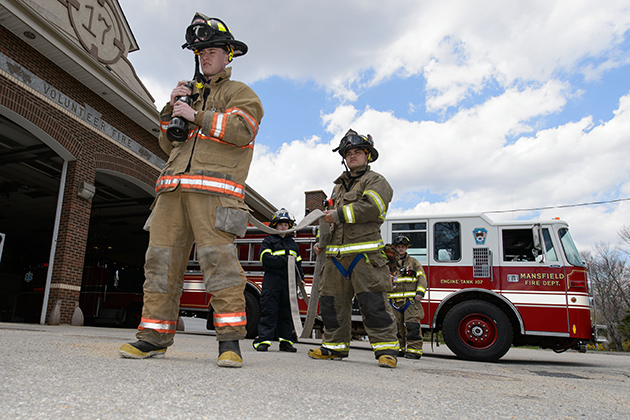
A handful of UConn students are learning professional firefighting skills while helping out in the community as volunteers with the Mansfield Fire Department.
“Volunteer firefighters find themselves in a position to do really remarkable things,” says Mansfield Fire Chief Dave Dagon, who has led the department for 10 years since coming out of retirement from his previous stint at the same post in East Hartford. “It’s a heck of an experience here.”
He says volunteers need discipline if they are to complete the training required to earn a uniform, especially if they are also full-time students. To become certified members of the department, volunteers-in-training have to complete various courses, and learn how to don firefighter’s gear, use a fire hose, and rescue victims.
New volunteers spend at least six months in probationary membership while learning firehouse culture from veteran members and how to use various fire-fighting apparatus. Mansfield’s fire station is a “combination department,” consisting of volunteers as well as professionals, and the 13 volunteers currently working at the station have ample opportunity to learn from the more experienced members. Dagon says both groups are critical to the success of an operation.
UConn sophomore and volunteer Cory Bacon says “everyone in the department is treated like equals. Chief Dagon is a book full of knowledge, and I’m privileged to have the opportunity to learn from him.”
Dagon says dozens of volunteers have come through the programs he has overseen, including students from other local schools as well as UConn. Although each recruit is vetted carefully before joining, he says the quality of their experience depends on the time and effort they choose to put into it.
“A volunteer’s success here depends on him or her following guidelines and policies developed over many years’ experience based on delivery of those services over periods of significant chaos,” he says. “New members learn how they can assist in a supporting role.”
Four courses must be completed during the probationary period – CPR, blood-borne diseases, hazardous materials awareness, and fire ground safety – before recruits are allowed to respond to calls. After completing the courses, the volunteers receive firefighting gear and a pager.
Their roles and responsibilities as firefighters are still restricted, however, depending on their level of training. For example, to become classified as Emergency Medical Technician (EMT) or Firefighter l or ll-certified, they must take separate courses that involve many additional hours of classroom learning.
[Elsewhere,] they hand you a red helmet and you’re a volunteer. [At the Mansfield Fire Department], you have to achieve certain requirements set out for you.
Bacon, a landscape architecture major, says he’s had no problem balancing the multiple hours he spends in the studio with the ever-present prospect of a call coming via his pager.
He says his grades have gone up since he started volunteering as a firefighter last fall, adding that the knowledge that a call could come at any time is a good way to keep himself grounded with his schoolwork.
Bacon has also discovered that some practical lessons from his firehouse training have helped him in class. “A lot of what I learn here, I can put toward my major,” he says, recalling a class trip to the construction site near UConn’s Charter Oak residence halls. “They were talking about frame-truss buildings – and because I already knew what that was from my time here, I knew what it meant before any of my classmates.”
Bacon, who is also a volunteer in his hometown, respects the high standards of the Mansfield fire department. Elsewhere, he says, “they hand you a red helmet and you’re a volunteer. Here, you have to achieve certain requirements set out for you.”
Danielle Struble, a senior allied health major from Wallingford, also emphasizes the importance of the training, even if it’s not used directly at the scene of an incident. The daughter of a fire chief, Struble remembers a call she took while working the department’s reception desk from a 16-year-old who threatened to kill himself.
“It was one of my first calls,” she says, tearing up over the memory.
She was eventually able to calm the young man down, but the severity of the situation was not lost on her. “You never know if you’re going to say something wrong,” she says. “There’s always something new to learn.”
While the student volunteer firefighters in Mansfield’s Fire department recognize the high-stakes nature of their job, they welcome the opportunity to work for the town of Mansfield. “We take pride in how the fire station works,” says Bacon.
Dagon says the students learn a lot about problem-solving. He says bizarre calls for help are common, and recounts a story about rescuing a blind horse trapped in a swamp. Such situations often require a creative use of equipment designed for other purposes, and that’s one of the reasons the fire department spends so much time teaching its volunteers about the equipment.
Bacon says learning to cope with the unexpected gives student firefighters-in-training confidence that the people they want to help can depend on their skills.
Joe Molleur, a senior molecular and cell biology major at UConn, says he has really enjoyed the time he’s spent training and working at the firehouse and has made new friends there.
“We hang out with each other on the weekends. We enjoy each other’s company,” he says. “[I consider them] a second family.”



